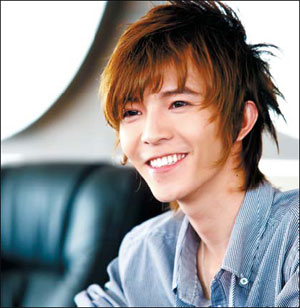
|
SHOWBIZ> Theater & Arts
 |
|
The write stuff
By Lin Qi (China Daily)
Updated: 2008-07-08 16:31
 Guo Jingming, the youngest member of the Chinese Writers' Association, is one of the richest and best-selling Chinese writers.
Some may dislike his cross-dressing appearance and excessive obsession with fashion. Others may criticize his writing style, which is characterized by flamboyant fantasy elements that have won him a large base of frenzied fans. And literary critics say he acts more like a pop idol, than a writer. Yet most people agree that 25-year-old Guo Jingming knows how to combine literature, individualism and commercialism. He is the youngest member of the Chinese Writers' Association and one of the richest and best-selling Chinese writers. The controversial author recently made headlines again at last week's launch of The Next, a national competition for young writers. Guo, one of the executive judges, stole much of the limelight because he was the only "Post-1980s generation" representative sitting alongside a very strong panel of judges, including eminent writers, such as Wang Meng, Zhang Kangkang and Liu Zhenyun. Guo is also more involved in the competition than simply giving his judgments. The competition, which runs until next July, will introduce a knockout system, drawing inspiration from TV contest shows such as American Idol, which Guo is reportedly to have thoroughly studied. In fact, Guo wrote lyrics for the theme song of Super Boys, a Chinese equivalent of American Idol. Writers under 25 are invited to submit original essays to the organizing committee. The committee will select 36 entrants in the first round by the end of November. Judges and readers can vote online and their votes will jointly decide who will move forward to the next round. The winner will receive 100,000 yuan ($14,490) and a worldwide franchise contract on English copyright with the Penguin publishing house. He or she will also have opportunities to visit prestigious universities abroad. Top Novel, a teenage literary magazine produced by Guo's Ke Ai entertainment company and also one of the competition's organizers, will follow the whole event. It will publish the essays of the 36 contestants, their backgrounds and judges' comments. The competition is designed to nurture the participants, some of whom may be the next big literary stars. At the press launch, Guo was frequently asked whether the competition will discover another Guo Jingming. He won first prize of New Concept, a national essay contest for high school students. He won the competition two years running. The event has generated a dozen of China's young celebrity writers, such as Guo. "The time has improved. The society has developed. The mode and criteria of some essay contests these days are out of date, for people's demands for literature are changeable," Guo says. Organizers say The Next competition is entirely different from other essay contests, in which prize-winning works were acknowledged only by authorities. This time the readers will vote. In the past, one essay decided whether a contestant would win or lose. The result was quite accidental, Guo says of his winning at the New Concept. He hopes the contestants fully showcase their personality and other talents. "First, I don't think I will choose someone like me as my future rival," he says. "I wish that he could be accepted by both the elder generation of writers and the market." Some orthodox writers have harshly criticized young writers whom they claim put aside literary pursuits and "blindly adjust their writings to readers' bad tastes". "It is like when you have rice, you can also make noodles," jokes Wang Meng, renowned writer and chief adviser of the competition, who doesn't think literary and market success are contradictory. He says that unorthodox writing styles will bring refreshing elements to literature. Hai Yan, whose novels have been successfully turned into popular TV series, concluded that literary talents keep emerging in new generations, but they are unrivalled for only three or five days. (China Daily 07/08/2008 page18) |